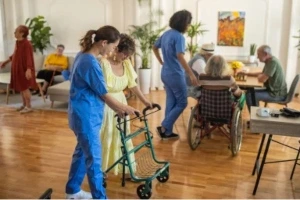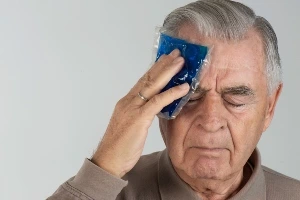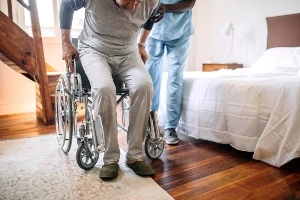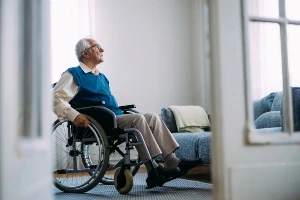
When nursing homes fail to follow proper sanitation and hygiene practices, it can lead to the spread of dangerous infectious diseases. Elderly residents, who may already have compromised immunity due to various medical conditions, are especially at risk of serious or fatal harm when exposed to viral bacterial infections.
If your loved one contracted an illness due to poor infectious disease control in a nursing home, you may be eligible to seek compensation for their medical costs, pain and suffering, and other damages. Our experienced Albuquerque nursing home abuse attorneys are fierce advocates for the elderly, and we are prepared to fight for the justice your loved one deserves. Contact our trusted law firm today for a free case review. We can answer your questions and determine if you may have a valid case.
Call PKSD for a free case review today: 505-677-7777
What Are the Most Common Infections in Albuquerque Nursing Homes?
Nursing homes can battle several recurring infections that impact elderly residents. These infections spread rapidly in confined living environments, particularly when infection control protocols are not followed.
Respiratory Infections
Influenza, commonly referred to as the flu, is a highly contagious disease. It can pose a huge threat to nursing homes and usually peaks between October and April. Even though vaccines are available for influenza, an outbreak can still occur if a staff member comes to work while ill or if visitor screening protocols are not followed.
The spread of COVID-19 shows how quickly respiratory infections can devastate nursing home populations. Although there has been a decline in the spread of COVID-19, the ongoing risk requires vigilant monitoring, proper PPE usage, and clear isolation procedures.
Pneumonia can develop as a complication of other respiratory infections and accounts for many nursing home hospitalizations. Bacterial pneumonia spreads quickly when staff members do not practice proper hand hygiene between resident interactions.
Antibiotic-Resistant Infections
Methicillin-resistant Staphylococcus aureus (MRSA) is a type of bacteria that has developed resistance to many antibiotics and can spread through direct contact. Proper wound care, environmental cleaning, and adherence to isolation protocols can help prevent the transmission of MRSA. However, these measures require time and training that understaffed facilities often lack.
Vancomycin-resistant Enterococci (VRE) poses another serious threat in local nursing homes. These bacteria typically affect residents with weakened immune systems and can cause life-threatening bloodstream infections.
Gastrointestinal Infections
Clostridium difficile (C. diff) causes severe diarrhea and intestinal inflammation. This infection spreads through spores that survive on surfaces for months.
Norovirus is a highly contagious virus that causes gastroenteritis, characterized by inflammation of the stomach and intestines. An outbreak could spread quickly through contaminated food, surfaces, or person-to-person contact.
What Infection Control Standards Must New Mexico Nursing Homes Follow?
New Mexico nursing homes operate under regulatory systems designed to prevent the spread of infectious diseases. The New Mexico Department of Health implements these state-specific regulations requiring nursing homes to:
- Submit monthly infection data reports to state health authorities
- Participate in state infection prevention initiatives
- Maintain isolation protocols for specific infectious diseases common in New Mexico
- Follow state-mandated procedures during confirmed outbreaks
- Undergo annual state inspections focused on infection control practice
- Report any suspected outbreak to the Department of Health
- Submit detailed documentation about infection sources and spread
- Cooperate with state epidemiologists during facility investigations
How Do Nursing Homes Fail to Prevent Infectious Disease Outbreaks?
Nursing homes frequently fall short in their infectious disease prevention efforts due to systemic failures across multiple areas of operation. These shortcomings create dangerous environments where preventable infections flourish among vulnerable residents.
Infectious disease outbreaks can occur due to:
- Inadequate Staff Training: If nursing facilities provide only minimal instruction during orientation without ongoing education, it could lead to inconsistent handwashing or improper glove use.
- Insufficient Hand Hygiene and PPE: Basic infection control measures often fail due to high-pressure work, limited access to sinks, empty sanitizer stations, and shortages of gloves, masks, and gowns.
- Poor Cleaning Procedures: Environmental contamination spreads when high-touch surfaces are poorly disinfected, staff lacks proper training, shared equipment is neglected, and terminal cleaning is rushed.
- Improper Isolation Practices: Facilities may delay isolation, mix staff assignments, share bathrooms between residents under different precautions, and prematurely end isolation.
- Inadequate Screening: Nursing homes may spread infections through poor visitor screenings, missed vaccination checks, incomplete admission reviews, and inadequate hospital transfer precautions.
- Staffing Shortages: Short-staff facilities may cut corners on time-consuming protocols.
Why Does Understaffing Lead to Infection Control Problems in Nursing Homes?
When a nursing home is understaffed, it can create an environment that is prone to infection control failures in multiple ways, such as:
Time Constraints and Rushed Care
In nursing homes with limited staff, caregivers often rush through essential tasks. This time pressure leads to:
- Staff skipping handwashing between resident contacts
- Improperly putting on and taking off personal protective equipment like gloves or masks
- Inadequate environmental cleaning and disinfection
- Rushed medication administration increasing cross-contamination risk
Increased Staff Workloads and Burnout
Understaffed facilities place excessive burdens on available caregivers. For instance, higher patient-to-staff ratios mean that each caregiver has to contact more residents, potentially spreading pathogens.
Other actions that cause staff workloads and burnout are:
- Physical and emotional exhaustion leads to decreased compliance with infection control protocols
- Burnout contributes to higher turnover, creating a cycle of inexperienced staff
- Stress affects cognitive function, increasing error rates in infection prevention measures
Compromised Resident Care
Direct resident care suffers in understaffed environments. Understaffed nursing homes may provide less frequent assistance with personal hygiene and may delay changes in soiled clothing or bedding.
These risks could also jeopardize resident care:
- Delayed recognition of early infection symptoms
- Untimely catheter care increases urinary tract infection risk
- Reduced mobility assistance leading to pressure ulcers that can become infected
When Does Poor Infection Control Become Legal Negligence in New Mexico?
Poor Infection Control in New Mexico Healthcare settings may constitute legal negligence when:
- A duty of care existed between the healthcare provider and the patient
- The provider breached infection control standards by failing to implement and adhere to accepted hygiene and sanitation practices
- This breach directly led to the spread of an infectious disease and caused harm to the patient
- The patient suffered provable damages
New Mexico follows comparative negligence principles, meaning liability may be assigned proportionally among multiple parties. For example, direct caregivers and facility administrators could share liability if they did not adhere to hygiene practices, such as washing their hands before feeding or caring for a resident. Facility administrators may be liable for operational failures, such as inadequate staffing or not implementing policies and protocols to prevent the spread of infections.
Residents and their families typically must prove that the nursing home failed to implement reasonable measures caused negligence. Healthcare facilities in New Mexico are required to comply with state and federal standards. Repeated infection control violations, despite being aware of the risks, generally strengthen negligence claims.
How to Recognize Signs of Poor Infection Control in Nursing Homes
When you are visiting a loved one, watch out for these key signs:
- Visible Cleanliness Issues: Dirty surfaces and bedding, overflowing trash or biohazard containers
- Staff Practices: Improper or inconsistent handwashing or shared medical equipment without proper disinfection
- Resident Patterns: Similar infections among residents or your loved one facing recurring infections
- Facility Red Flags: Strong odors of urine, feces, or excessive cleaning chemicals or overwhelmed staff
- Documentation Concerns: Missing infection control policies, outdated protocols, or reluctance to share infection rate data
What Can Families Do If a Nursing Home Is Negligent
If your loved one’s nursing home failed to control an infection, you have options to protect their health and rights:
- Document Everything: Create a detailed record of all symtoms, conversations with staff, and facility conditions. Take dated photos of any visible signs of infection or unsanitary conditions as vital evidence.
- Report to Regulatory Authorities: File formal complaints with the New Mexico Department of Health and the state’s Long-Term Care Ombudsman Program, which can conduct unannounced inspections and issue citations.
- Seek Immediate Medical Intervention: Request independent medical evaluation outside the facility to identify issues overlooked by nursing home staff and create objective medical records.
- Consult with an Attorney: Speak with a lawyer experienced in nursing home negligence cases involving infectious disease outbreaks. Many Albuquerque attorneys offer free initial consultations.
- Consider Transfer Options: In severe situations, relocate your loved one to a facility with better infection control practices, ensuring medical records are accurately transferred.
- Engage with Resident Councils: Connect with the nursing home’s resident or family council to address systemic infection control problems affecting multiple residents.
- Review Facility Records: Request copies of infection control policies, outbreak response plans, staff training records, and infection rate data, which facilities must provide access to.
Call PKSD if Your Loved One Is Facing Nursing Home Negligence
When nursing homes fail to meet the standards of care for infection control practices, they put vulnerable residents at risk for preventable illnesses and serious harm. Whether negligence stems from understaffing, poor training, or systemic issues, you may be eligible to seek justice on behalf of your family member.
At PKSD, we have seen firsthand the devastation families experience when elderly residents are harmed by nursing home negligence. There is no need to face a legal challenge on your own. We have a team of highly qualified nursing home abuse attorneys who are ready to fight tirelessly on behalf of your loved one. We have a proven history of securing favorable outcomes for our clients. There are no upfront costs or fees to pay, but there are strict filing deadlines. Call us today to see how we can help.
PKSD. We get results for you. Call: 505-677-7777 to see how we can help today.






